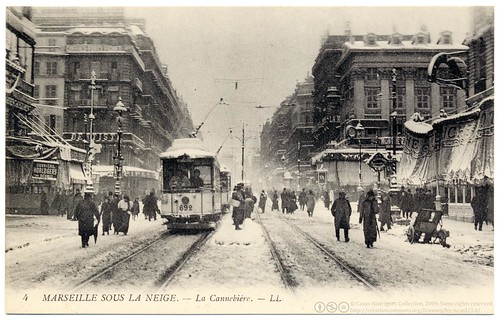I inherited a bound set of The War Illustrated from my paternal
grandparents. One hundred years after its publication I'm exploring its pages to discover the people and their times.
Part of the largest volunteer army in the world arrived in Marseilles on 26th September 1914. The European war was starting to encompass the globe. The Indian soldiers were poorly equipped for the cold and still wore khaki drill uniforms more appropriate for warmer climates.
 |
| Marseille under the snow 1914. - The Cannebière. |
All the hard times were in the future as the War Illustrated of 10th October shows them marching through the city of Marseilles in September 1914. (The Germans would have the first sight of them at Hollelbeke on October 31st)
There must have been a lot of photographers on the streets because marching Indian troops in Marseilles is an image which appears in a number of postcards and publications but it does highlight those light weight uniforms. Over a million Indian soldiers would fight in World War One but those who were injured might find themselves in the more congenial surroundings of 
 |
| From the Royal Pavilion Museums of Brighton and Hove collection |
| Royal Pavilion at Dusk from Wikipedia |
| Indian Cavalry from Europeana 1914-18 (Netherlands National Archive, Den Haag) |
Indian perspectives of World War One:-
"The Indian Sepoy in the First World War" by Santanu Das article on the British Library 'World War'
"The Last Post: letters home to India in the First World War" - Guardian 21 February 2014



